Are you torn between sports and video games? It’s a common dilemma in today’s digital age. Did you know that over 500 million people watched esports events last year? This blog post will show how both sports and video games can boost your life skills.
Ready for a fun ride?
Key Takeaways
Sports and video games both offer unique benefits, with over 500 million people watching esports events last year.
Physical sports build fitness, teamwork, and social skills, while video games enhance problem-solving, creativity, and cognitive abilities.
Esports is growing rapidly, with 8,600 U.S. high schools fielding teams since 2018 and 1 in 4 Americans preferring esports to traditional sports.
Both sports and video games improve reaction times, decision-making, and memory, though a 2022 study suggests gaming may not boost reaction times as much as previously thought.
Pro athletes now use video games for training, while sports video games help fans engage with their favorite teams, especially during events like the COVID-19 pandemic.
Table of Contents
Exploring Sports and Video Games
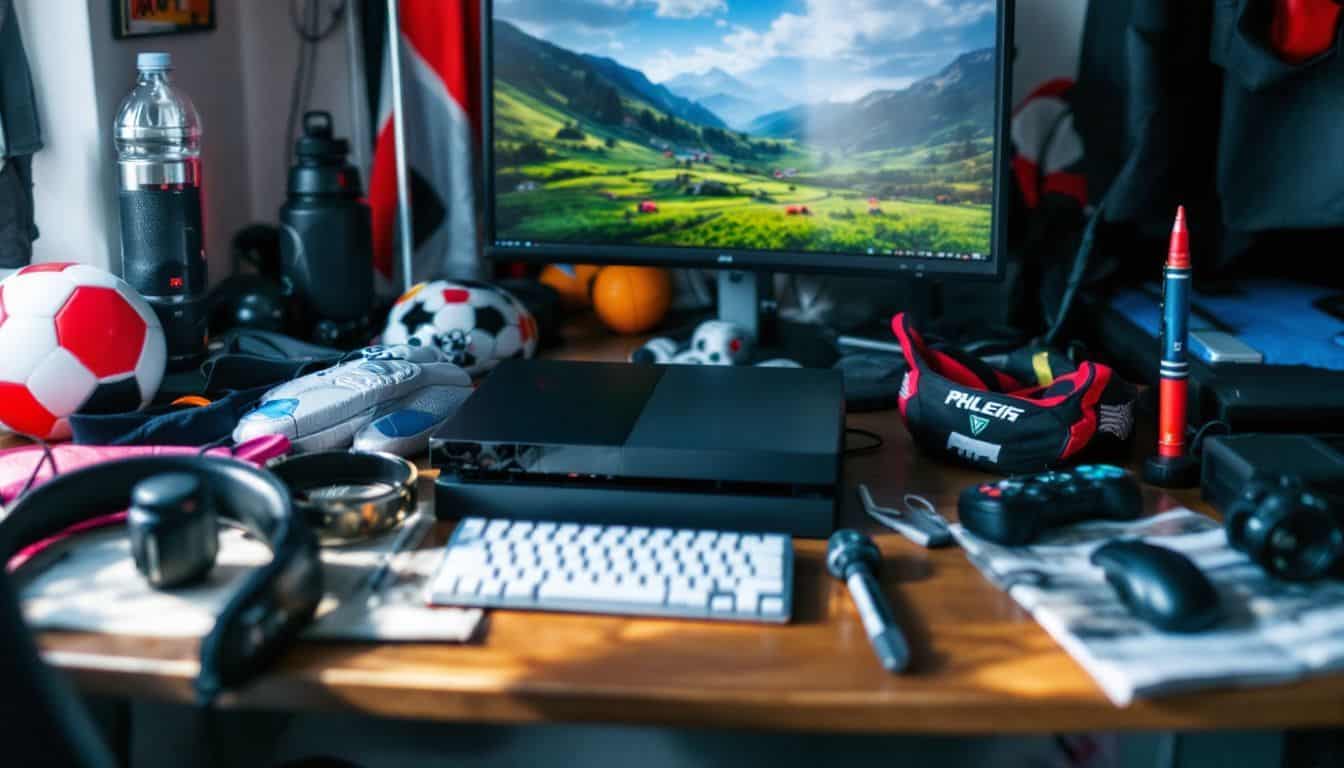
Sports and video games both offer thrills, but in different ways. Let’s dive into what makes each tick – from sweating on the field to mashing buttons on a controller.
What Defines Sports?
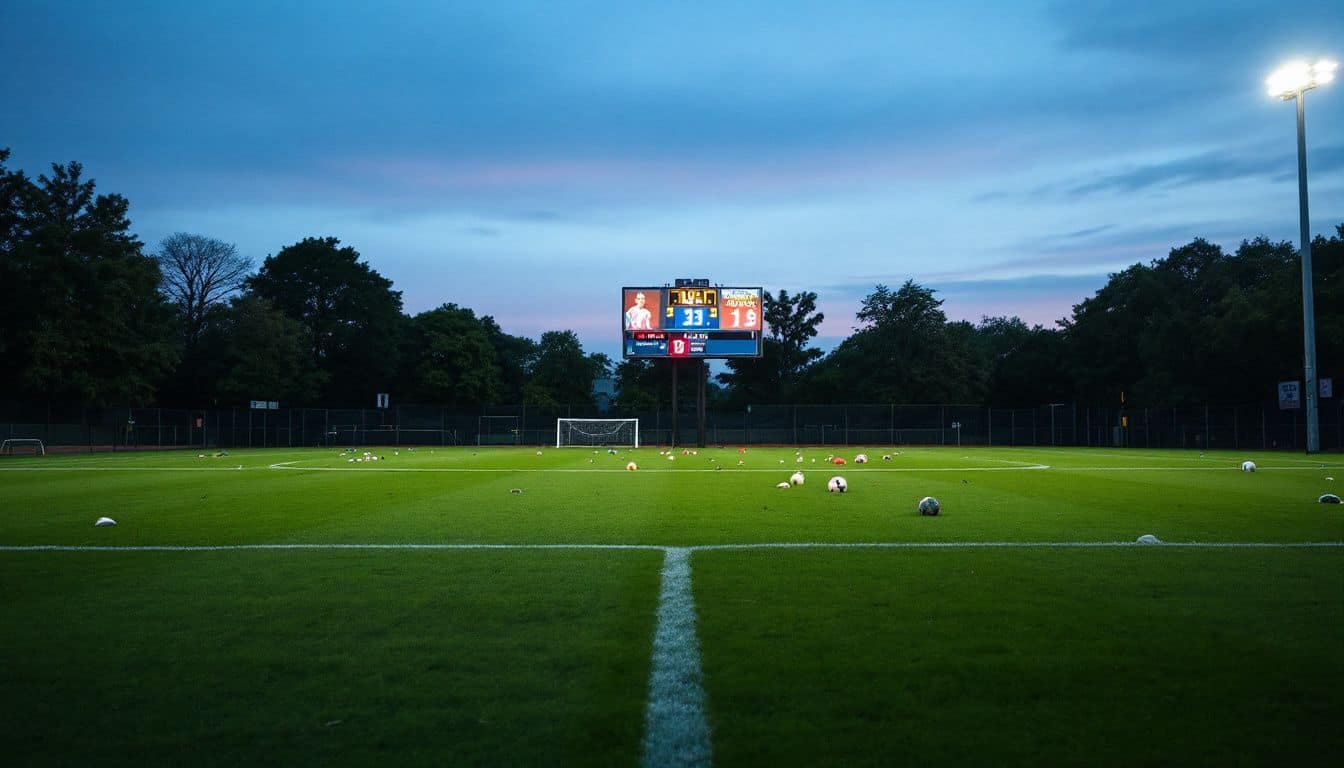
Sports aren’t just about running and jumping. They’re a mix of physical skill, rules, and competition. Think about skateboarding – it’s now in the Olympics! This shows how sports keep changing.
Team sports teach kids a lot. They learn to talk better, make friends, and be creative. Plus, they pick up respect and discipline.
Physical activity does more than keep you fit. It helps people get along better. You learn about different cultures and how to be fair. Some folks even bet on sports, just like they do with the best online casinos in Canada for video games and esports.
Sports are always growing and changing, just like the people who play them.
Sports are a universal language that bridges cultures and fosters understanding.
What Defines Video Games?
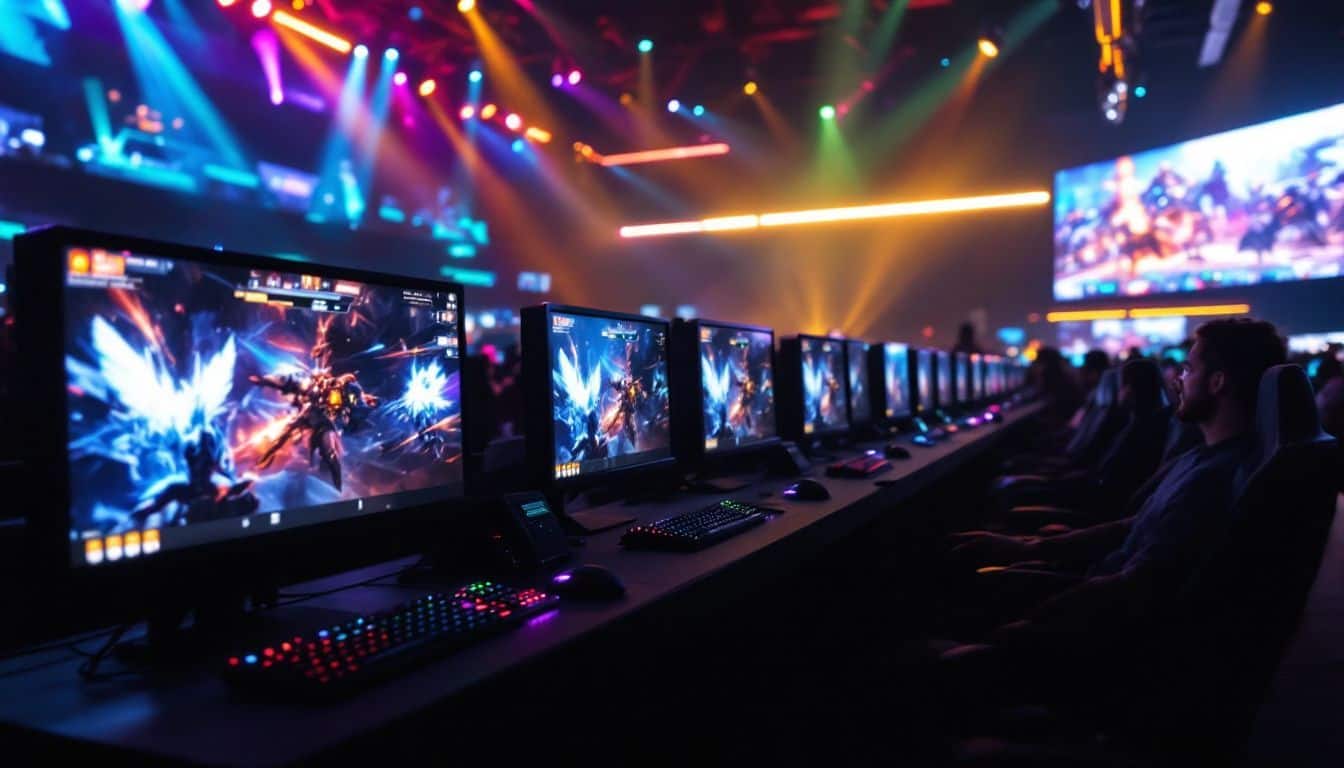
Video games are digital playgrounds that challenge our minds and reflexes. They’re interactive stories where we become the heroes, solving puzzles and battling foes. From simple mobile apps to complex console epics, games come in all shapes and sizes.
They test our problem-solving skills, boost our creativity, and even help us learn.
But video games aren’t just solo adventures anymore. They’ve become a social hub, connecting players worldwide. Esports has exploded, with over 8,600 U.S. high schools fielding teams since 2018.
Even the NBA jumped on board, launching its own 2K League. Games now demand skill and focus like traditional sports, minus the sweat. And get this – a 2021 survey found 1 in 4 Americans prefer esports to regular sports.
Plus, more women are joining the action, proving gaming isn’t just a boys’ club. Whether you’re racing cars or building empires, video games offer a unique blend of fun, challenge, and community.
Analyzing Physical and Cognitive Demands
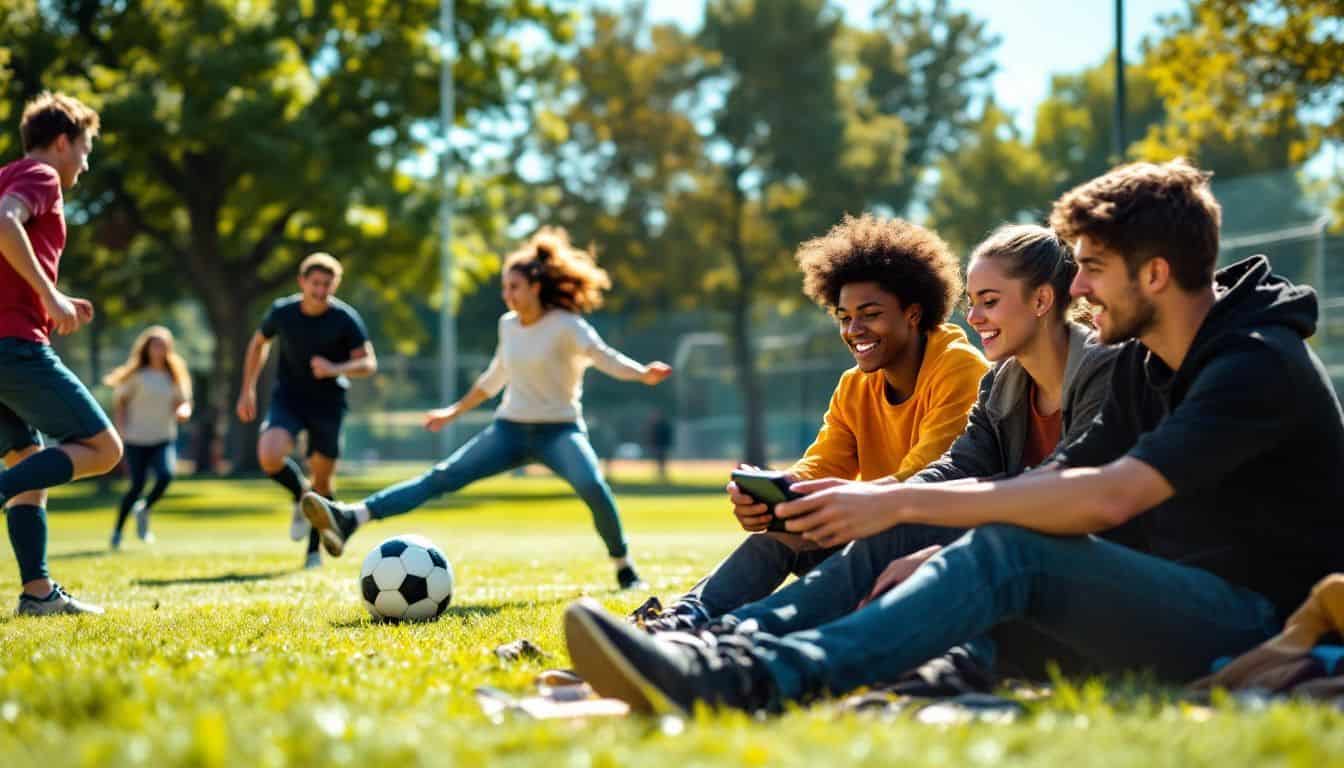
Sports and video games push our bodies and brains in different ways. Let’s dive into how each one challenges us – physically and mentally.
Physical Challenges in Sports
Sports push your body to its limits. They test your strength, speed, and stamina. Think of a runner’s burning legs in a marathon or a boxer’s aching muscles after a fight. These challenges build physical fitness and prevent health issues like obesity.
Athletes often train for hours daily, pushing through pain and fatigue. Their hearts race, muscles strain, and sweat pours as they strive to improve.
But it’s not just about brute force. Sports also hone fine motor skills and reaction times. A baseball player must swing at just the right moment. A gymnast needs perfect balance and control.
These skills carry over to daily life, boosting overall physical ability. Next, let’s look at how video games challenge our minds.
Cognitive Challenges in Video Games
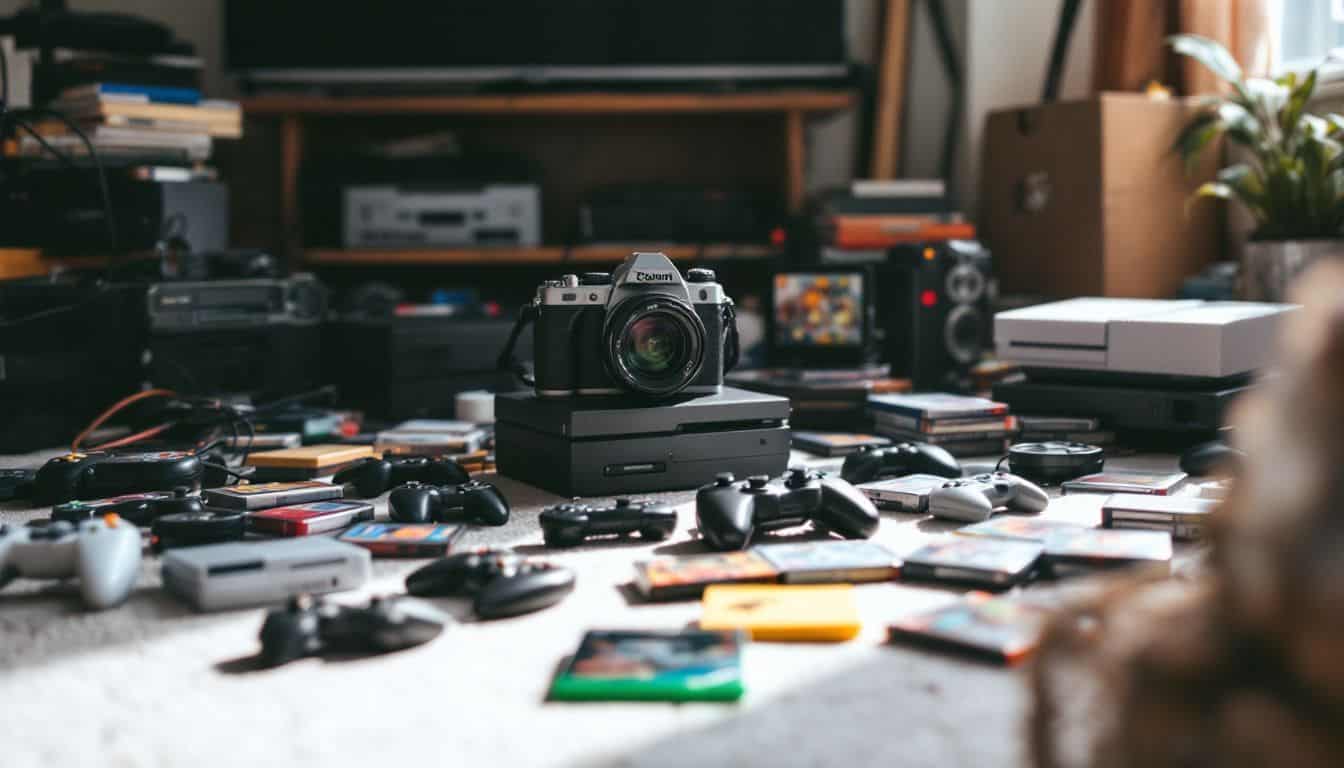
Video games are great for your brain. They’re fun and give your mind a workout. Gamers do better at tasks that test quick thinking and decision-making. They’re also good at remembering things and handling multiple pieces of information.
Brain scans show gamers use different brain areas when thinking compared to non-gamers.
Video gaming enhances brain activity in areas related to attention, memory, and cognitive flexibility.
These brain benefits are practical. Gamers improve their focus and ability to switch between tasks. It’s like exercise for your mind, but much more enjoyable. Let’s compare how video games and sports affect social skills next.
Examining Competition and Social Interaction

Competition and social interaction are key parts of both sports and video games. They push us to be our best and connect with others – whether on a field or through a screen.
The Competitive World of Sports
Sports are a battleground of sweat and grit. Athletes push their limits daily, striving to be the best. In pro leagues, the stakes are sky-high. Millions watch as players duke it out on fields and courts.
But it’s not just about the pros. Youth sports are huge too. Kids learn teamwork and grit through friendly matches. They’re eight times more likely to stay active as adults. That’s a win for health and fun!
Competition isn’t just physical. It’s a mind game too. Athletes must think fast and stay cool under pressure. They train their brains as much as their bodies. This mental workout boosts critical thinking skills.
It even helps in school. Sports stars often shine in class too. The competitive spirit spills over, driving success in all areas of life.
Social and Competitive Dynamics in Video Games
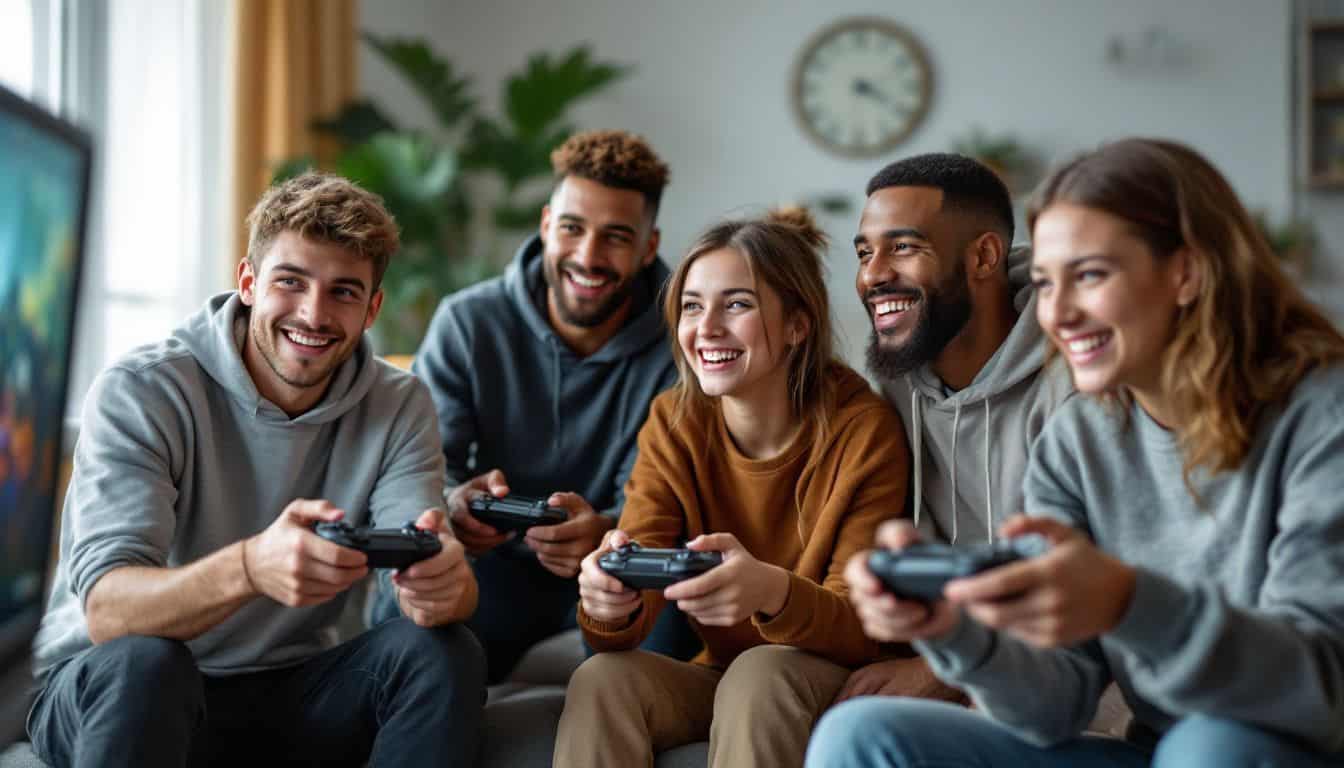
Moving from the physical arena to the digital space, video games offer a unique twist on competition. Gamers face off in virtual worlds, testing their skills and reflexes. But it’s not just about winning – these games create social bonds too.
Friends team up to tackle tough bosses or battle each other for bragging rights.
The social aspect of gaming has grown hugely in recent years. Over 500 million people watched esports events last year, compared to traditional sports.
That’s a lot of folks tuning in! As a gamer myself, I’ve felt the rush of a close match and the joy of chatting with teammates. It’s not all fun and games though. A 2022 study found that gaming might not improve reaction times as much as we thought.
Still, the social benefits are hard to ignore.
Video games aren’t just games anymore. They’re a new form of social interaction and competition.
Benefits of Participating in Sports and Video Games

Sports and video games pack a punch with their benefits. They’re not just fun – they’re brain boosters and body builders rolled into one.
Health Benefits from Sports
Playing sports is like a health boost for your body. It strengthens your heart and improves lung function. You’ll have more energy and sleep soundly at night. Sports also help maintain a healthy weight and keep your bones strong.
But that’s not all! Sports benefit your mind as well as your body. They can lift your mood and increase happiness. After each basketball game I played… my stress disappeared. Sports also teach teamwork and improve self-confidence.
It’s like gaining real-life skills!
Cognitive and Social Advantages from Video Games
Video games aren’t just fun – they’re brain boosters too! Gamers often have better attention spans and sharper minds. Studies show that gaming can grow gray matter in your brain.
This extra brain stuff helps you control your moves and handle feelings better. Plus, games make you think fast and solve tricky puzzles. It’s like a gym workout for your noggin!
But wait, there’s more! Games also help you make friends and work as a team. Online gaming lets you chat with folks from all over the world. You learn to lead, follow, and work together to win.
It’s pretty cool how a “fun” hobby can teach such useful skills. So next time someone says you’re wasting time gaming, tell ’em you’re leveling up your brain and social skills!
The Intersection of Sports and Video Games

Sports and video games are joining forces in cool ways. Pro athletes now use gaming to sharpen their skills, while fans get more into sports through video games.
Influence of Video Games on Athletes
Video games are changing how athletes train and play. Many pro players use games to sharpen their minds and skills. A study found 38% of young male gamers play games based on their real-life sports.
This trend is growing fast. Games help athletes learn plays, study opponents, and boost reaction times.
But it’s not just about training. Video games also help athletes relax and bond with teammates. After a tough practice, many pros unwind with a gaming session. It’s a fun way to build team spirit off the field.
Next, let’s look at how video games are changing how fans engage with sports.
The Role of Video Games in Sports Fan Engagement
Video games are changing how fans connect with sports. They’re not just games anymore – they’re a new way to experience your favorite teams and players. Sports video games let fans step into their heroes’ shoes, play as their idols, and feel like they’re part of the action.
This tech boost has made games more real than ever. You can almost smell the grass on the field or hear the roar of the crowd.
The COVID-19 pandemic pushed sports video games into the spotlight. With live games off the table, fans turned to virtual matches to get their fix. Big leagues caught on fast. They started their own esports events, mixing real sports with gaming.
Now, you can watch pro gamers play as your team in official tournaments. It’s a whole new ball game for sports fans – one where the action never stops, even when the stadium lights go dark.
People Also Ask
How do sports and video games affect our brains?
Both sports and video games can boost our mental processes. Physical activities like cycling improve our working memory and processing speed. Video games can sharpen our cognitive abilities, especially in the prefrontal cortex. They’re like a gym for our brain!
Can playing video games help with depression?
Some studies suggest video games might help with mental health issues like depression. They can be a fun escape from a sedentary lifestyle. But don’t forget, too much screen time isn’t good. Balance is key!
Do sports and video games impact kids differently than adults?
You bet! During childhood and adolescence, our brains are like sponges. Sports help with physical development, while video games can aid cognitive development. Both can influence social behavior. It’s not just child’s play – it’s brain training!
Are there gender differences in how sports and video games affect us?
Research shows some differences, but it’s not set in stone. Boys and girls might prefer different games or sports. But both can reap benefits. It’s not about Mars vs. Venus – it’s about finding what clicks for you!
Can video games improve academic achievement?
Believe it or not, some games might give your grades a power-up! They can boost problem-solving skills and even crystallized intelligence. But don’t ditch the books for Bowser just yet. Moderation is the name of the game!
Are violent video games bad for kids?
This question’s trickier than a Mario level! Some worry about aggression, but the jury’s still out. Many factors come into play, like age and game content. Parents should be like referees – keeping an eye on the action and calling timeouts when needed.
References
https://thesportjournal.org/article/recognizing-esports-as-a-sport/
https://www.ncbi.nlm.nih.gov/pmc/articles/PMC10374067/
https://exerciseright.com.au/the-physical-demands-of-esports-athletes/
https://pmc.ncbi.nlm.nih.gov/articles/PMC9368460/
https://pmc.ncbi.nlm.nih.gov/articles/PMC9593235/
https://journals.sagepub.com/doi/full/10.1177/2042753020949983
https://www.scripps.org/news_items/7580-what-are-the-surprising-benefits-of-youth-sports-programs (2024-04-22)
https://www.sutterhealth.org/health/teens/sports-fitness/benefits-of-sports
https://health.clevelandclinic.org/are-video-games-good-for-you (2022-11-15)
https://infillion.com/blog/the-hidden-connections-between-sports-and-video-games/ (2024-02-21)
https://www.linkedin.com/pulse/intersection-sports-gaming-popularity-video-games-nisha-dhumal
